COMMENTARY: By David Robie, editor of Asia Pacific Report
With the door now shut on 2024, many will heave a sigh of relief and hope for better things this year.
Decolonisation issues involving the future of Kanaky New Caledonia and West Papua –- and also in the Middle East with controversial United Nations votes by some Pacific nations in the middle of a livestreamed genocide — figured high on the agenda in the past year along with the global climate crisis and inadequate funding rescue packages.
Asia Pacific Report looks at some of the issues and developments during the year that were regarded by critics as “betrayals”:
- READ MORE: The hopes and fears of displaced West Papuans as a Prabowo presidency looms
- At ICJ, lawyer for Palestine rips US and Fiji for defending Israel
- Fiji human rights group condemns ‘troubling’ support for Israel at ICJ
- West Papua: Once was Papuan Independence Day, now facing ‘ecocide’, transmigration
- COP29: Pacific climate advocates decry outcome as ‘a catastrophic failure’
1. Fiji and PNG ‘betrayal’ UN votes over Palestine
Just two weeks before Christmas, the UN General Assembly voted overwhelmingly to demand an immediate ceasefire in the Gaza Strip under attack from Israel — but three of the isolated nine countries that voted against were Pacific island states, including Papua New Guinea.
The assembly passed a resolution on December 11 demanding an immediate, unconditional and permanent ceasefire in Gaza, which was adopted with 158 votes in favour from the 193-member assembly and nine votes against with 13 abstentions.
Of the nine countries voting against, the three Pacific nations that sided with Israel and its relentless backer United States were Nauru, Papua New Guinea and Tonga.
The other countries that voted against were Argentina, Czech Republic, Hungary and Paraguay.
Thirteen abstentions included Fiji, which had previously controversially voted with Israel, Micronesia, and Palau. Supporters of the resolution in the Pacific region included Australia, New Zealand, and Timor-Leste.
Ironically, it was announced a day before the UNGA vote that the United States will spend more than US$864 million (3.5 billion kina) on infrastructure and military training in Papua New Guinea over 10 years under a defence deal signed between the two nations in 2023, according to PNG’s Foreign Minister Justin Tkatchenko.
Any connection? Your guess is as good as mine. Certainly it is very revealing how realpolitik is playing out in the region with an “Indo-Pacific buffer” against China.
However, the deal actually originated almost two years earlier, in May 2023, with the size of the package reflecting a growing US security engagement with Pacific island nations as it seeks to counter China’s inroads in the vast ocean region.
Noted BenarNews, a US soft power news service in the region, the planned investment is part of a defence cooperation agreement granting the US military “unimpeded access” to develop and deploy forces from six ports and airports, including Lombrum Naval Base.
Two months before PNG’s vote, the UNGA overwhelmingly passed a resolution demanding that the Israeli government end its occupation of Palestinian territories within 12 months — but half of the 14 countries that voted against were from the Pacific.
Affirming an International Court of Justice (ICJ) opinion requested by the UN that deemed the decades-long occupation unlawful, the opposition from seven Pacific nations further marginalised the island region from world opinion against Israel.
Several UN experts and officials warned against Israel becoming a global “pariah” state over its 15 month genocidal war on Gaza.
The final vote tally was 124 member states in favour and 14 against, with 43 nations abstaining. The Pacific countries that voted with Israel and its main ally and arms-supplier United States against the Palestinian resolution were Federated States of Micronesia, Fiji, Nauru, Papua New Guinea, Palau, Tonga and Tuvalu.
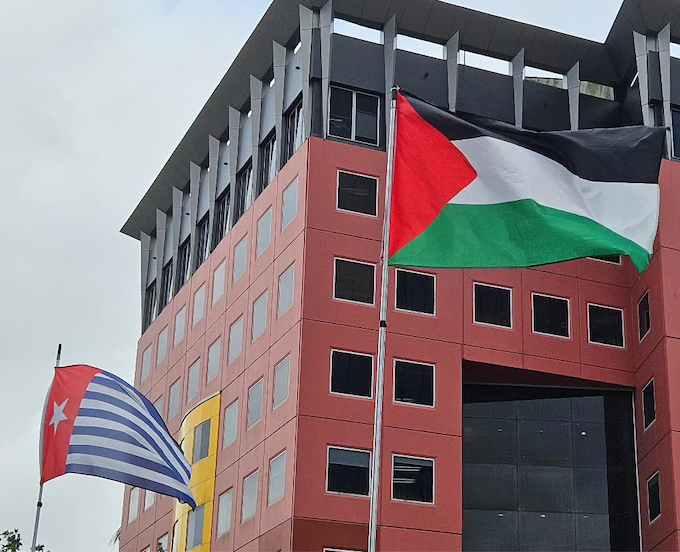
In February, Fiji faced widespread condemnation after it joined the US as one of the only two countries — branded as the “outliers” — to support Israel’s occupation of the Palestinian territory in an UNGA vote over an International Court of Justice (ICJ) advisory opinion over Israel’s policies in the occupied territories.
Condemning the US and Fiji, Palestinian Foreign Minister Riyad al-Maliki declared: “Ending Israel’s impunity is a moral, political and legal imperative.”
Fiji’s envoy at the UN, retired Colonel Filipo Tarakinikini, defended the country’s stance, saying the court “fails to take account of the complexity of this dispute, and misrepresents the legal, historical, and political context”.
However, Fiji NGOs condemned the Fiji vote as supporting “settler colonialism” and long-standing Fijian diplomats such as Kaliopate Tavola and Robin Nair said Fiji had crossed the line by breaking with its established foreign policy of “friends-to-all-and-enemies-to-none”.
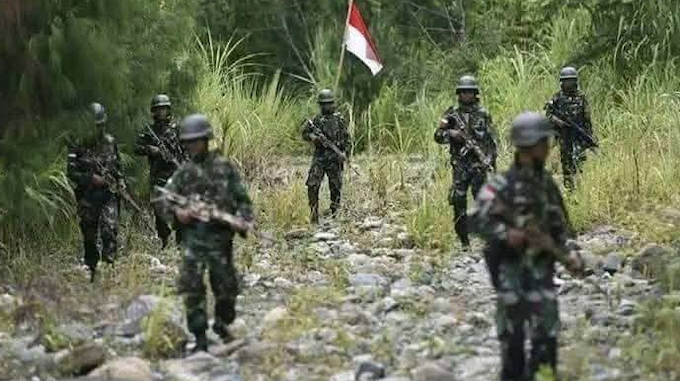
2. West Papuan self-determination left in limbo
For the past decade, Pacific Island Forum countries have been trying to get a fact-finding human mission deployed to West Papua. But they have encountered zero progress with continuous roadblocks being placed by Jakarta.
This year was no different in spite of the appointment of Fiji and Papua New Guinea’s prime ministers to negotiate such a visit.
Pacific leaders have asked for the UN’s involvement over reported abuses as the Indonesian military continues its battles with West Papuan independence fighters.
A highly critical UN Human Right Committee report on Indonesia released in May highlighted “systematic reports about the use of torture” and “extrajudicial killings and enforced disappearances of Indigenous Papuan people”.
But the situation is worse now since President Prabowo Subianto, the former general who has a cloud of human rights violations hanging over his head, took office in October.
Fiji’s Sitiveni Rabuka and Papua New Guinea’s James Marape were appointed by the Melanesian Spearhead Group in 2023 as special envoys to push for the UN High Commissioner for Human Rights’ visit directly with Indonesia’s president.
Prabowo taking up the top job in Jakarta has filled West Papuan advocates and activists with dread as this is seen as marking a return of “the ghost of Suharto” because of his history of alleged atrocities in West Papua, and also in Timor-Leste before independence.
Already Prabowo’s acts since becoming president with restoring the controversial transmigration policies, reinforcing and intensifying the military occupation, fuelling an aggressive “anti-environment” development strategy, have heralded a new “regime of brutality”.
And Marape and Rabuka, who pledged to exiled indigenous leader Benny Wenda in Suva in February 2023 that he would support the Papuans “because they are Melanesians”, have been accused of failing the West Papuan cause.
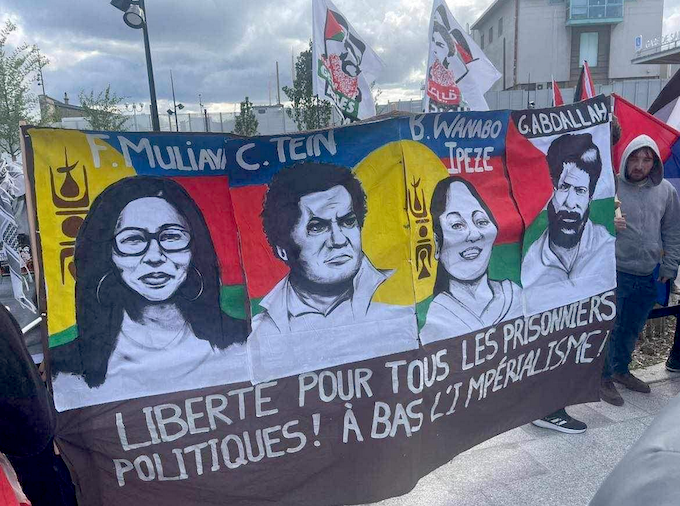
/X
3. France rolls back almost four decades of decolonisation ‘progress’
When pro-independence protests erupted into violent rioting in Kanaky New Caledonia on May 13, creating havoc and destruction in the capital of Nouméa and across the French Pacific territory with 14 people dead (mostly indigenous Kanaks), intransigent French policies were blamed for having betrayed Kanak aspirations for independence.
I was quoted at the time by The New Zealand Herald and RNZ Pacific of blaming France for having “lost the plot” since 2020.
While acknowledging the goodwill and progress that had been made since the 1988 Matignon accords and the Nouméa pact a decade later following the bloody 1980s insurrection, the French government lost the self-determination trajectory after two narrowly defeated independence referendums and a third vote boycotted by Kanaks because of the covid pandemic.
This third vote with less than half the electorate taking part had no credibility, but Paris insisted on bulldozing constitutional electoral changes that would have severely disenfranchised the indigenous vote. More than 36 years of constructive progress had been wiped out.
“It’s really three decades of hard work by a lot of people to build, sort of like a future for Kanaky New Caledonia, which is part of the Pacific rather than part of France,” I was quoted as saying.
France had had three prime ministers since 2020 and none of them seemed to have any “real affinity” for indigenous issues, particularly in the South Pacific, in contrast to some previous leaders.
In the wake of a snap general election in mainland France, when President Emmanuel Macron lost his centrist mandate and is now squeezed between the polarised far right National Rally and the left coalition New Popular Front, the controversial electoral reform was quietly scrapped.
New French Overseas Minister Manual Valls has heralded a new era of negotiation over self-determination. In November, he criticised Macron’s “stubbornness’ in an interview with the French national daily Le Parisien, blaming him for “ruining 36 years of dialogue, of progress”.
But New Caledonia is not the only headache for France while pushing for its own version of an “Indo-Pacific” strategy. Pro-independence French Polynesian President Moetai Brotherson and civil society leaders have called on the UN to bring Paris to negotiations over a timetable for decolonisation.
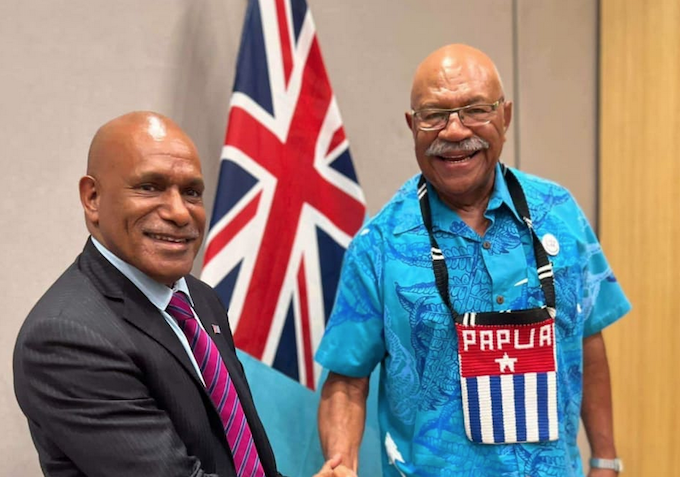
Kanaks and the Pacific’s pro-decolonisation activists had hoped that an intervention by the Pacific Islands Forum in support of the Kanak and Socialist National Liberation Front (FLNKS) would enhance their self-determination stocks.
However, they were disappointed. And their own internal political divisions have not made things any easier.
On the eve of the three-day fact-finding delegation to the territory in October, Fiji’s Rabuka was already warning the local government (led by pro-independence Louis Mapou to “be reasonable” in its demands from Paris.
In other words, back off on the independence demands. Rabuka was quoted by RNZ Pacific reporter Lydia Lewis as saying, “look, don’t slap the hand that has fed you”.
Rabuka and Cook Islands Prime Minister Mark Brown and then Tongan counterpart Hu’akavameiliku Siaosi Sovaleni visited the French territory not to “interfere” but to “lower the temperature”.
But an Australian proposal for a peacekeeping force under the Australian-backed Pacific Policing Initiative (PPI) fell flat, and the mission was generally considered a failure for Kanak indigenous aspirations.
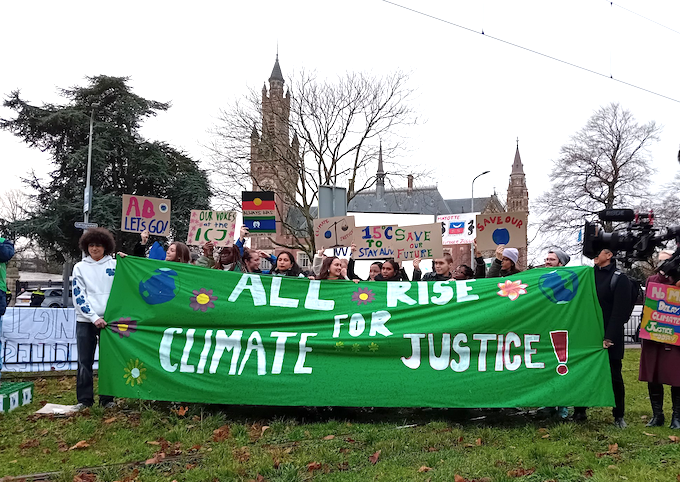
5. Climate crisis — the real issue and geopolitics
In spite of the geopolitical pressures from countries, such as the US, Australia and France, in the region in the face of growing Chinese influence, the real issue for the Pacific remains climate crisis and what to do about it.
Controversy marked an A$140 million aid pact signed between Australia and Nauru last month in what was being touted as a key example of the geopolitical tightrope being forced on vulnerable Pacific countries.
This agreement offers Nauru direct budgetary support, banking services and assistance with policing and security. The strings attached? Australia has been granted the right to veto any agreement with a third country such as China.
Critics have compared this power of veto to another agreement signed between Australia and Tuvalu in 2023 which provided Australian residency opportunities and support for climate mitigation. However, in return Australia was handed guarantees over security.
The previous month, November, was another disappointment for the Pacific when it was “once again ignored” at the UN COP29 climate summit in the capital Baku of oil and natural gas-rich Azerbaijan.
The Suva-based Pacific Islands Climate Action Network (PICAN) condemned the outcomes as another betrayal, saying that the “richest nations turned their backs on their legal and moral obligations” at what had been billed as the “finance COP”.
The new climate finance pledge of a US$300 billion annual target by 2035 for the global fight against climate change was well short of the requested US$1 trillion in aid.
Climate campaigners and activist groups branded it as a “shameful failure of leadership” that forced Pacific nations to accept the “token pledge” to prevent the negotiations from collapsing.
Much depends on a climate justice breakthrough with Vanuatu’s landmark case before the International Court of Justice (ICJ) arguing that those harming the climate are breaking international law.
The case seeks an advisory opinion from the court on the legal responsibilities of countries over the climate crisis, and many nations in support of Vanuatu made oral submissions last month and are now awaiting adjudication.
Given the primacy of climate crisis and vital need for funding for adaptation, mitigation and loss and damage faced by vulnerable Pacific countries, former Pacific Islands Forum Secretary-General Meg Taylor delivered a warning:
“Pacific leaders are being side-lined in major geopolitical decisions affecting their region and they need to start raising their voices for the sake of their citizens.”
This content originally appeared on Asia Pacific Report and was authored by APR editor.
APR editor | Radio Free (2025-01-03T07:58:15+00:00) Five Pacific region geopolitical ‘betrayals’ in 2024. Retrieved from https://www.radiofree.org/2025/01/03/five-pacific-region-geopolitical-betrayals-in-2024/
Please log in to upload a file.
There are no updates yet.
Click the Upload button above to add an update.